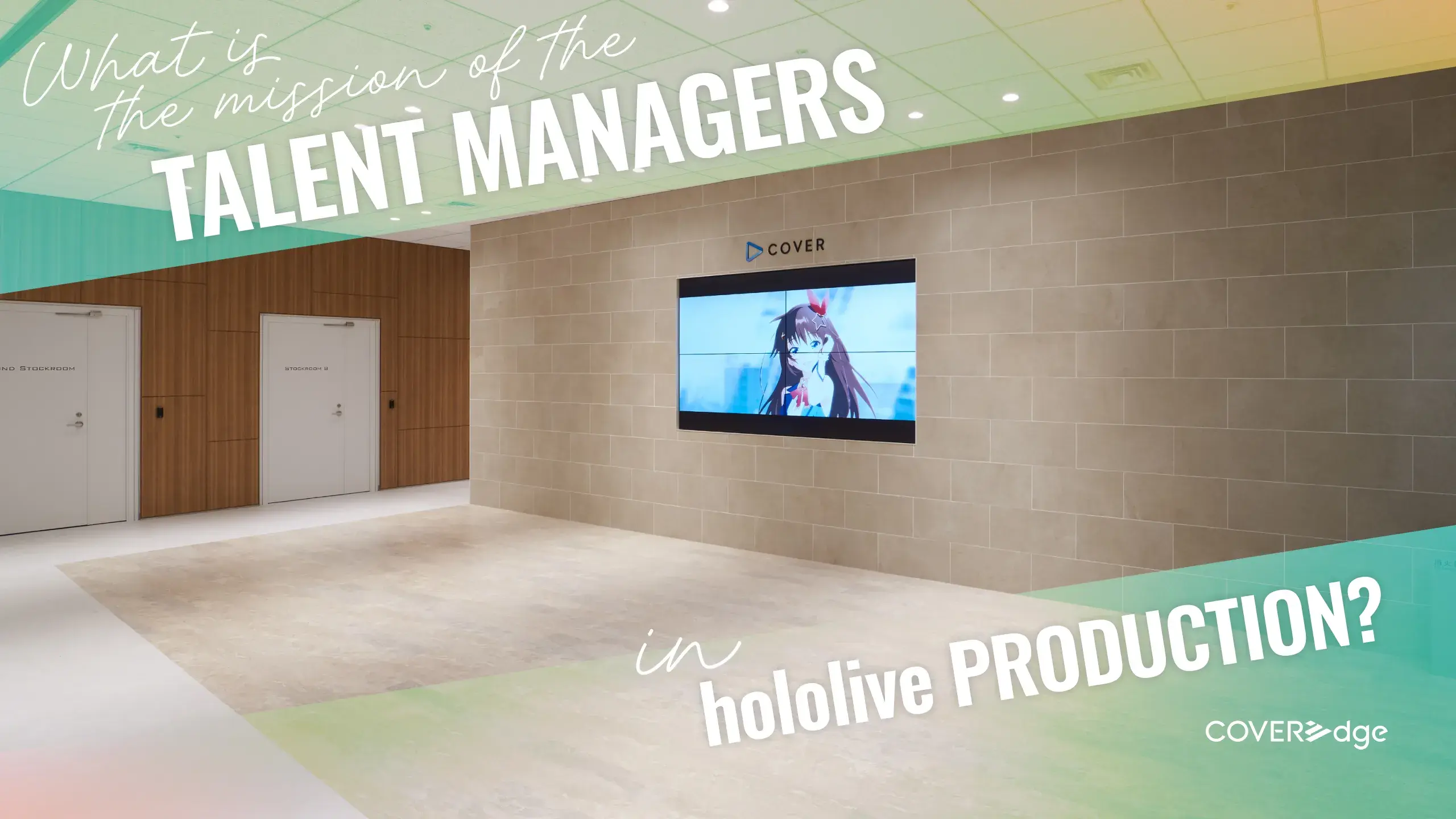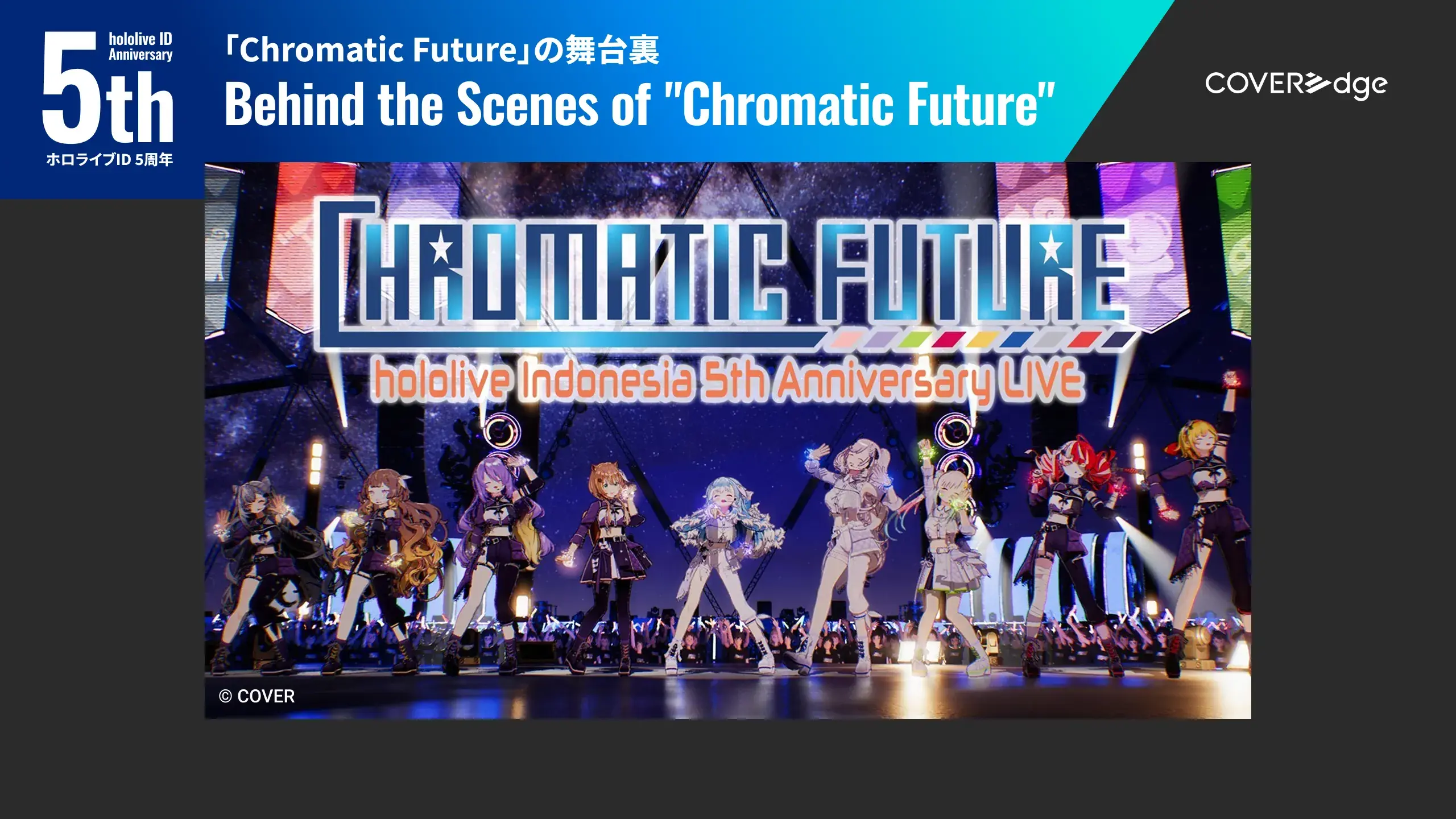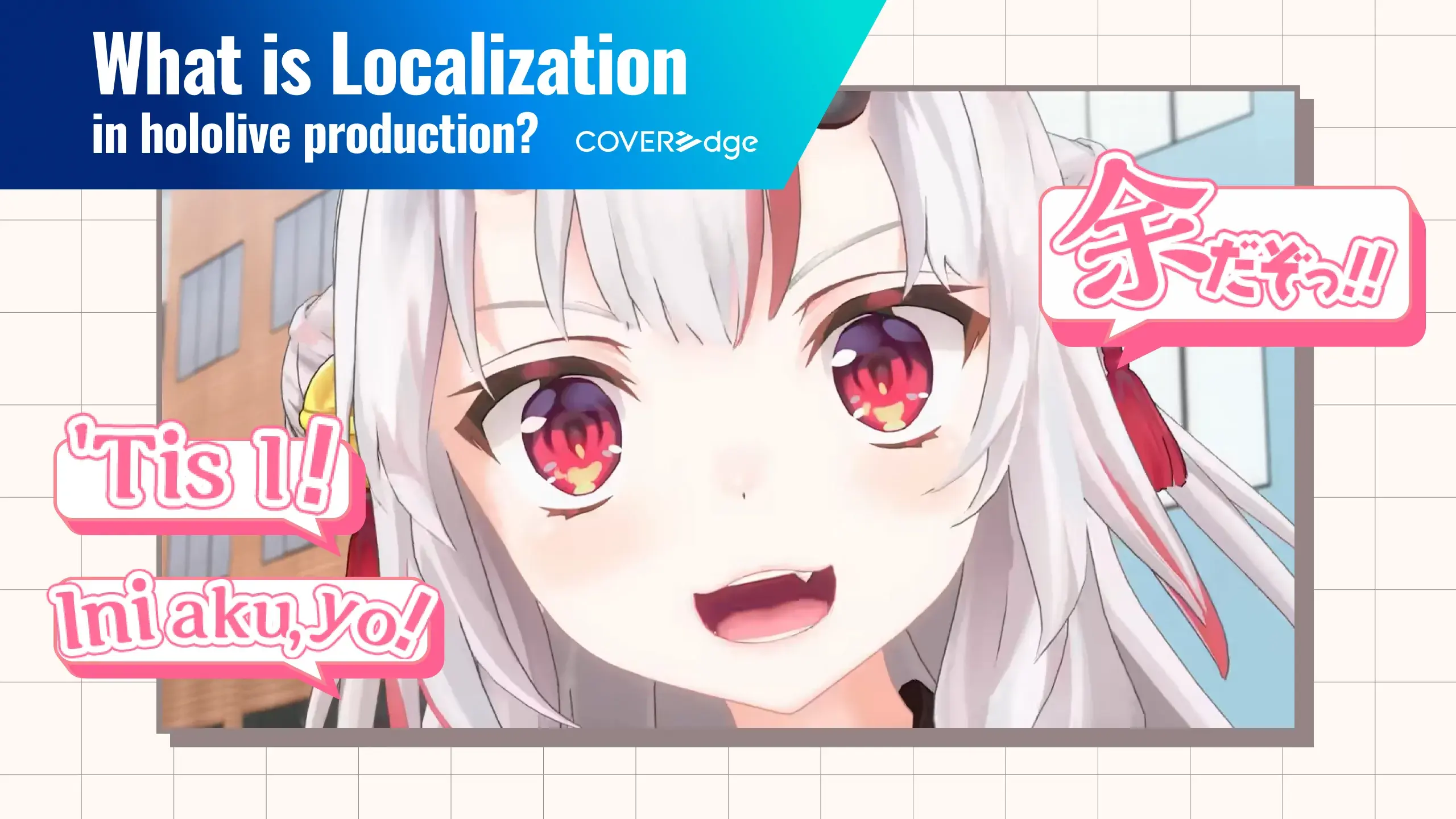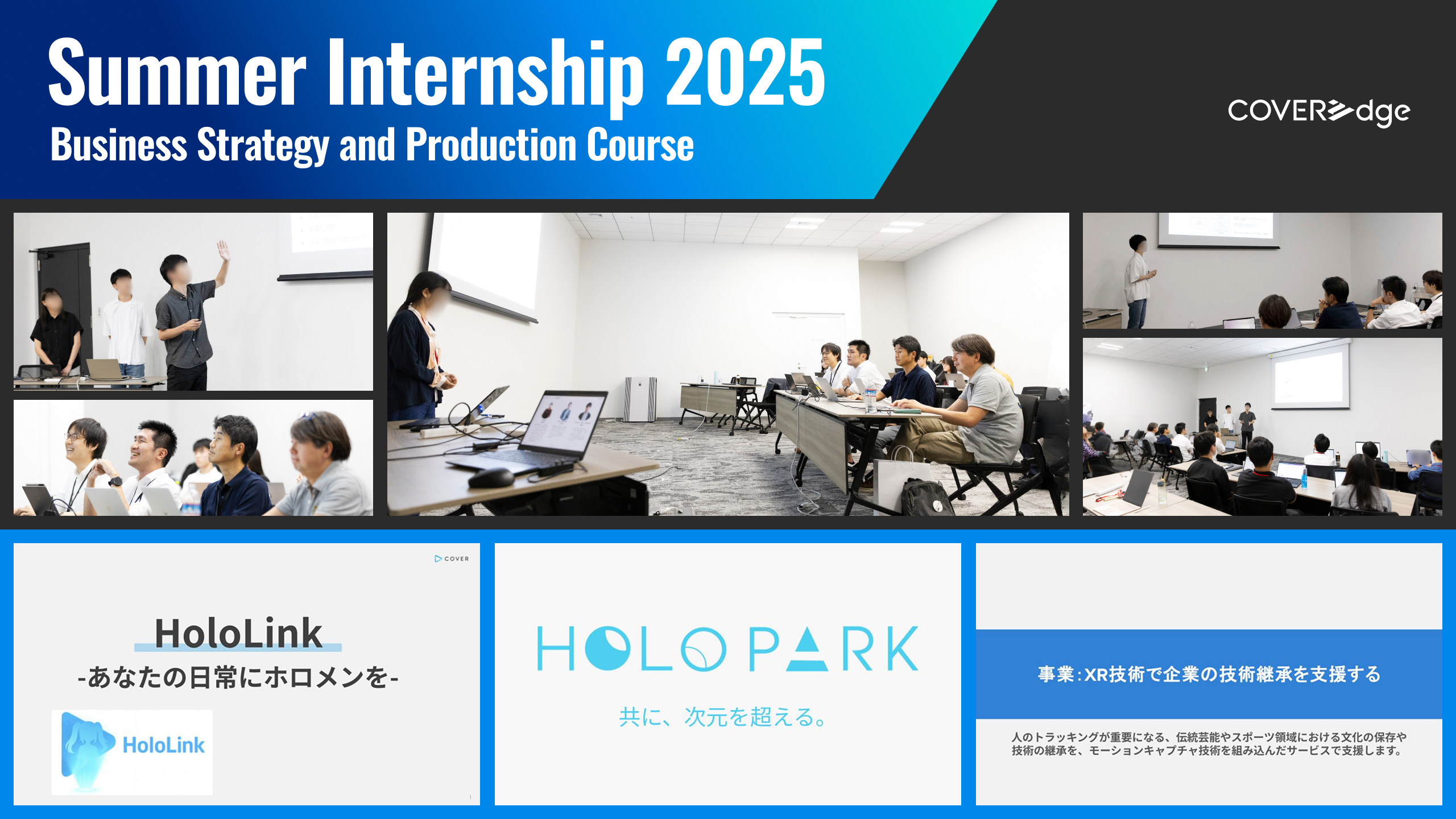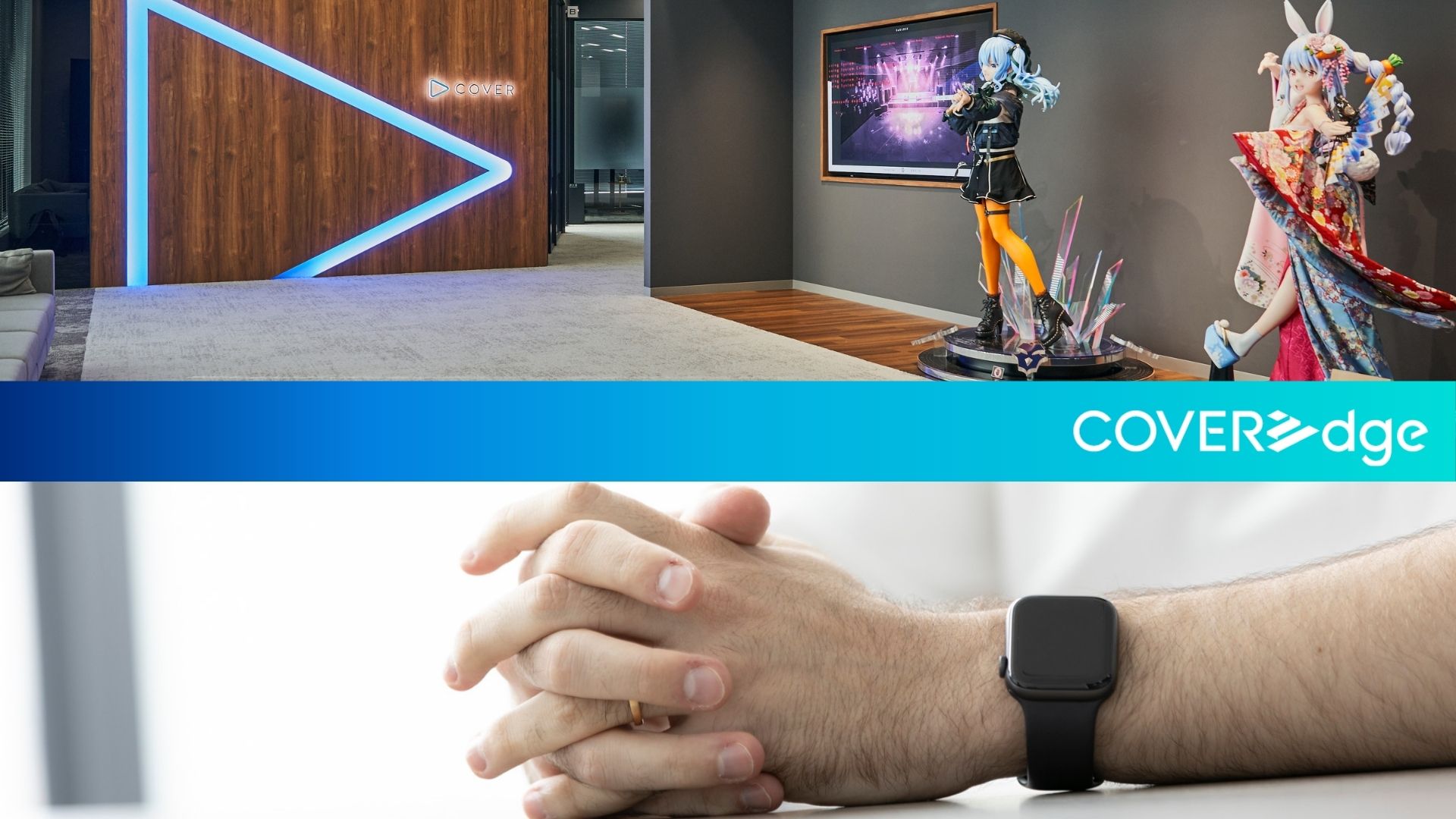
*This article is a reprint of COVER’s official note published on May 31, 2024.
This time, we bring you an interview with two members of the Business Development Team of the Corporate Planning Office.
They talk about what kind of work they are doing now in the entertainment industry, having jumped into the industry from a completely different one, how much knowledge on VTubers they needed, and what skills and experience from previous careers can be transferred over to the entertainment industry.
■ The Corporate Planning Office – supporting COVER’s business infrastructure, from rule-making to operational implementation

―Today, we are with two members who have changed industries to join COVER. First of all, could you please introduce yourselves?
S: I am working as a Business Development Team manager in the Corporate Planning Office.
T: I am also part of the Business Development Team. I am a team member working under S.
―What kind of work are you both doing? Let’s start with T who is working closer to the ground.
T: Broadly speaking, I have three main jobs.
Firstly, is business data management. In general here at COVER, our merchandising, music, events, and entertainment businesses are managed in-house, and we develop pipelines for the aggregated management of master data management tools and performance data.
Also, I look after music management rights. At COVER, we release hundreds of song titles annually, and with that, we need to be aware of and manage how copyright, publishing rights, and royalties for each song are defined in their relevant contracts. However, I don’t just have to understand the contracts; I’m also involved in music publishing business planning from a middle office perspective, such as the review of contract terms and conditions, and profitability estimations.
Lastly, I help provide PMO (Project Management Office) services in projects across our business departments. At COVER, we hold many large events every year, such as hololive SUPER EXPO 2024 and hololive 5th fes., but such is the scale of these projects that, as there are a wide range of staff and business partners involved, a special office is established to manage the progress of each event. Within my team, as PMO operations staff, we have a wide range of duties to carry out to ensure the success of each event, such as identifying and managing issues that arise, addressing various inquiries, and coordinating and resolving difficult situations.
S: As T has a background in systems and engineering, they use their relevant experience to help us develop basic infrastructure.
On the other hand, I often take on the role of facilitator for each project. I help resolve issues within each business department, as well as across the entire company, when it is unclear who will take responsibility, so that projects can run smoothly.
I am also in charge of reviewing existing company rules and establishing new ones. When reviewing existing rules, I often see ones that were created before projects were as big as they are today, and hence don’t necessarily apply to our current situation anymore. Therefore, I aim to introduce rules that are optimal for everyone, while taking into account the growth of the overall market and where we are as a business currently, in addition to other tasks such as holding meetings with stakeholders, creating documents and holding explanation sessions, etc.
■ Feelings you had entering the entertainment industry without any prior experience

―Could you both tell us about your previous jobs?
T: I joined a think tank after graduating, working as a consultant in the public sector. After that, I then worked as a BizDev in an e-commerce management venture company, which makes COVER the third company at which I’ve worked.
S: I also worked as a consultant, but after about 3 years, I started to feel like I really wanted to work in business reform at a business firm, which prompted me to change careers. COVER is the second company I’ve worked for.
―Why did you choose COVER?
T: I applied for a mid-career position in the fall of 2021, after I’d heard about COVER, this venture company rapidly on the rise, from someone I knew. At that time, COVER was rapidly expanding their business to meet increased streaming demands during the COVID-19 pandemic, and I heard that their middle and back offices couldn’t keep up with development. Despite not having knowledge of the entertainment industry, I applied because I felt I could contribute to building up COVER’s business infrastructure.
―Was there anything you felt anxious about, not having any experience in the entertainment industry?
T: Despite being tasked with work involving middle and back office functions, I was still worried that there’d be work that I wouldn’t be able to do if I didn’t know enough about VTubers. But, as it turns out, there was no need to worry.
It might seem like we are working in a specialized and unusual field as the term VTuber business may be somewhat unfamiliar to many, but all of our operations are in long-existing businesses such as merchandise sales, live entertainment, and music publishing. The VTuber business is made up of various other businesses, so just because you don’t have a full understanding of the entertainment industry, doesn’t mean you can’t do individual tasks themselves.
―Has there been anything since your career shift that was different to what you originally thought or did you feel there were any gaps you needed to overcome?
T: What really struck me was the amount of staff that love the company’s IP and value creativity. It feels amazing to be working for a company that places importance on quality and what fans think of our products.
―Thank you very much. And how about you S?
S: For me, I already liked the subculture, anime, video games, etc. and was often watching VTuber streams during the COVID-19 pandemic. Therefore, when I started looking for a job, I narrowed my search down to companies in the VTuber business, but most of the job opportunities were for engineer positions. So I applied at COVER, which was the only company looking to recruit a talent manager at the time, and was hired as part of the Corporate Planning Office based on my previous experience.
In the Corporate Planning Office, I feel that the ability to do one’s work with more neutral values is more sought after than having a wealth of experience in the entertainment industry and therefore stronger beliefs. We value the proper execution of what we can do in-house, without forcing anyone to work with specific talents or on particular content, nor adhere to traditional industry or company knowledge.
■ The motivation that comes from respecting creators
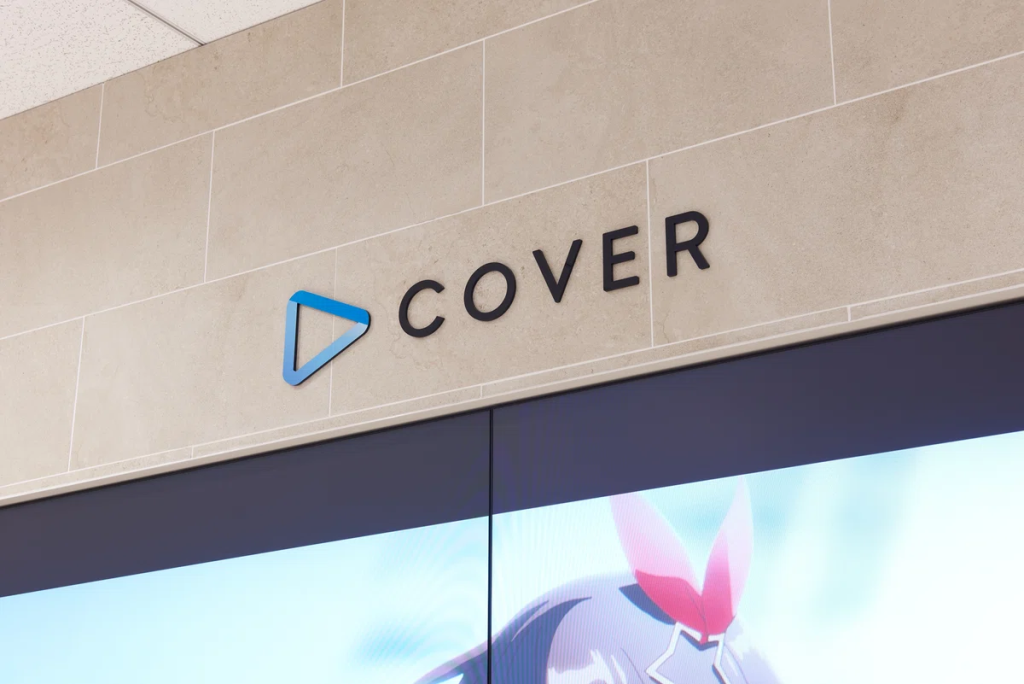
―The world of VTubers is relatively new in the entertainment industry, but there seem to be varying levels of acceptance and recognition. How do you feel VTubers have been received worldwide?
T: What I was told at my interview, which I still value to this day, was to respect content creators and not belittle them, and anyone who does the opposite is probably not suited to working at COVER.
While COVER’s mission is Together, Let’s Create Culture Loved by All, the fact that everyone working here is a creator in their own right, and is playing their part to produce content for our fans is deeply entrenched in the culture here.
I’m not originally from the entertainment industry myself, and not necessarily engaging in a lot of its content on a daily basis, but I believe that creativity and the commitment of creators should be respected, so I try to approach things with a mindset of enjoying something, even if I don’t fully understand it.
S: I also believe that one of COVER’s strengths is that we are a group of people who are here because we love the content; this is especially true of our engineers. As everyone takes pride in and is fond of the content we produce, I think it’s hard to work with those who don’t know anything about VTubers, and are just here because they make money.
― Is there anything you have to be mindful of when communicating with those in more creative positions?
T: There are various different branches at COVER including merchandise development, music publishing, live performances, and event management, all with members who have forged their own careers in different areas. It is difficult to have a full understanding of specialized content straight away, but from someone who has experience in client negotiations and internal coordination for the most part, there isn’t a lot of difference.
However, if I had to give an example, then I try to be mindful when it comes to finding a balance between the particular pace of the entertainment world and the pace of creativity. I can really relate to the fact there are two sides: the production side of things who are trying to maintain quality as much as possible and only just making deadlines, and sales promotion who want to keep up with current trends. When your work involves bringing ideas to life, while working out what needs to take precedence in that moment, you need to be able to make quick decisions that best suit each situation. I still find that hard at times even now.
S: The departments at COVER are separated by function, and the scale and specialization of some departments are like a small- to mid-sized company in that particular field. So, naturally, there are going to be differences between departments in terms of what needs to be focused on. Therefore, we make sure that everyone, such as those from different departments or those in management as opposed to those working on the ground etc., is working closely together where those who are usually focused on different things are on the same page. And I think it’s important to not just go around asking what everyone needs, but also be constantly engaged and thinking about what the overall best thing to be doing.
―What do you consider important when interviewing someone?
S: I am in charge of interviews, and I don’t necessarily focus on the size of the projects people have had experience with. Rather, I see more value in those who are willing to get their hands dirty when necessary.
T: We are interested in how much experience interviewees have with taking ownership of their work, or making decisions. Even if the projects weren’t very big, if they are able to talk about instances that involved trial-and-error or taking initiative, then I feel that will please interviewers.
■ Aiming to be a team that maximizes creativity and profitability

―At the moment, you’re working on developing business infrastructure, but what plans do you have to strengthen the team in the future?
S: First of all, we are going to strengthen the support for our business departments from an administrative/business management perspective. To give you an idea of what I mean, we would like to improve the way each of our businesses is conducted and provide support to achieve even better outcomes like an accompanying consultant providing comprehensive support to clients.
Something else we want to strengthen is our business data sector. We are entering domains that don’t have sufficient data, so rather than just getting data and analyzing it individually, we need to become a team that is developing infrastructure to be able to accumulate data on a daily basis.
On the other hand, we also want to be a team where young people can thrive – in terms of age, late 20s young. We would like to sit down with various business departments to discuss any issues and wishes they have so that we can improve the flexibility in which we can deal with any situation that arises.
―Could you both tell us what you are trying to aim towards?
T: This year, I would like to particularly focus on developing internal foundations that don’t hinder the growth of our business nor the ambition of our creators. While it is essential that we have rules and procedures in line with the company’s growth, these are meaningless if they stunt company growth or lessen our creators’ creativity. This is because ‘creation’ is why COVER as a company exists, and determines the value of our product. This balancing act is particularly difficult for us, but we hope to work with those who can share these thoughts.
S: I previously talked with T about how our team mission was to maximize the creativity and profitability at COVER, so this year, I would like to create a team that can embody this mission.

